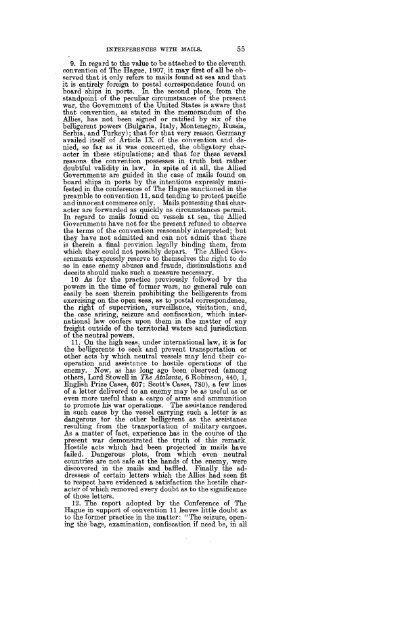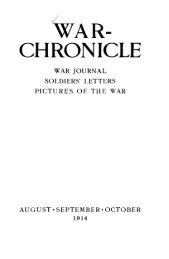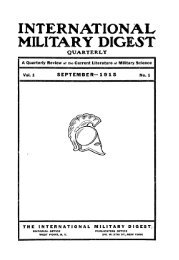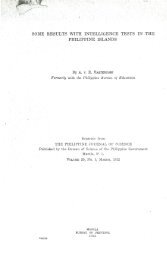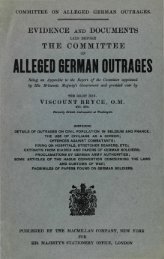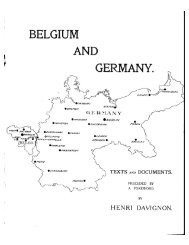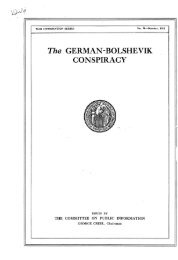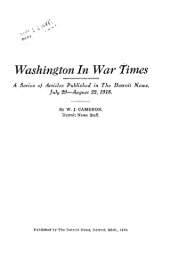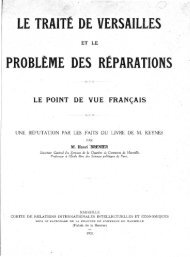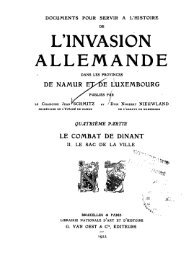DEPARTMENT OF STATE.
DEPARTMENT OF STATE.
DEPARTMENT OF STATE.
You also want an ePaper? Increase the reach of your titles
YUMPU automatically turns print PDFs into web optimized ePapers that Google loves.
INTERFERENCES WITH MAILS. 55<br />
9. In regard to the value to be attached to the eleventh<br />
convention of The Hague, 1907, it may first of all be observed<br />
that it only refers to mails found at sea and that<br />
it is entirely foreign to postal correspondence found on<br />
board ships in ports. In the second place, from the<br />
standpoint of the peculiar circumstances of the present<br />
war, the Government of the United States is aware that<br />
that convention, as stated in the memorandum of the<br />
Allies, has not been signed or ratified by six of the<br />
belligerent powers (Bulgaria, Italy, Montenegro, Russia,<br />
Serbia, and Turkey); that for that very reason Germany<br />
availed itself of Article IX of the convention and denied,<br />
so far as it was concerned, the obligatory character<br />
in these stipulations; and that for these several<br />
reasons the convention possesses in truth but rather<br />
doubtful validity in law. In spite of it all, the Allied<br />
Governments are guided in the case of mails found on<br />
board ships in ports by the intentions expressly manifested<br />
in the conferences of The Hague sanctioned in the<br />
preamble to convention 11, and tending to protect pacific<br />
and innocent commerce only. Mails possessing that character<br />
are forwarded as quickly as circumstances permit.<br />
In regard to mails found on vessels at sea, the Allied<br />
Governments have not for the present refused to observe<br />
the terms of the convention reasonably interpreted; but<br />
they have not admitted and can not admit that there<br />
is therein a final provision legally binding them, from<br />
which they could not possibly depart. The Allied Governments<br />
expressly reserve to themselves the right to do<br />
so in case enemy abuses and frauds, dissimulations and<br />
deceits should make such a measure necessary.<br />
10 As for the practice previously followed by the<br />
powers in the time of former wars, no general rule can<br />
easily be seen therein prohibiting the belligerents from<br />
exercising on the open seas, as to postal correspondence,<br />
the right of supervision, surveillance, visitation, and,<br />
the case arising, seizure and confiscation, which international<br />
law confers upon them in the matter of any<br />
freight outside of the territorial waters and jurisdiction<br />
of the neutral powers.<br />
11. On the high seas, under international law, it is for<br />
the belligerents to seek and prevent transportation or<br />
other acts by which neutral vessels may lend their cooperation<br />
and assistance to hostile operations of the<br />
enemy. Now, as has long ago been observed (among<br />
others, Lord Stowell in The Atalanta, 6 Robinson, 440, 1,<br />
English Prize Cases, 607; Scott's Cases, 780), a few lines<br />
of a letter delivered to an enemy may be as useful as or<br />
even more useful than a cargo of arms and ammunition<br />
to promote his war operations. The assistance rendered<br />
in such cases by the vessel carrying such a letter is as<br />
dangerous tor the other belligerent as the assistance<br />
. resulting from the transportation of military cargoes.<br />
As a matter of fact, experience has in the course of the<br />
present war demonstrated the truth of this remark.<br />
Hostile acts which had been projected in mails have<br />
failed. Dangerous plots, from which even neutral<br />
countries are not safe at the hands of the enemy, were<br />
discovered in the mails and baffled. Finally the addressess<br />
of certain letters which the Allies had seen fit<br />
to respect have evidenced a satisfaction the hostile character<br />
of which removed every doubt as to the significance<br />
of those letters.<br />
12. The report adopted by the Conference of The<br />
Hague in support of convention 11 leaves little doubt as<br />
to the former practice in the matter: "The seizure, opening<br />
the bags, examination, confiscation if need be, in all


